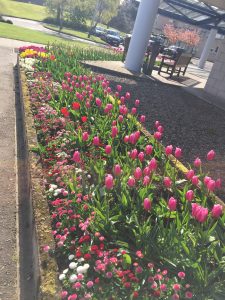Revision Week? What is that?
One of the most foreign concepts I am experiencing here at St. Andrews is this idea of a revision period. At Whitman we get exactly two days of revision to study for finals, and then boom! into the fiery pit of finals we plunge. Here at St. Andrews? We get a full two weeks.
I am both for and against this approach. On the one hand, finals here count for usually 60-100% of your grade, and typically on the higher end. In my case, both E&M’s and CompSci’s final count for 60%, and math’s is 90%. My friend has her math final as 100% of her grade. It’s crazy! Thus getting a full two weeks to prepare for the 3-4 finals you have probably seems reasonable. On the other hand, if you are like me at all, I find it next to impossible to study that hard on so few subjects for that many days in a row. In fact even if I maintain great productivity every day, the problem is my brain gets so full I actually become more confused and worried that I would have been had I only studied for a little bit the few days before.
So what do you do?
I can only speak from the point of view of other study-abroad students, unfortunately, but even then the verdict varies. A surprising number of them are staying here to study for the full two weeks for their exams, and started studying the day after classes ended. A few are taking only one trip for a couple days in the middle. Me and my friend are taking two trips that will result in only having one of the two weeks to study. I am sincerely hoping I do not regret this decision once the test days arrive, but I think it should be plenty.
The abundance of time that St. Andrews gives their students to study for finals is another testament to how different the school system is here. To succeed here, you either have to be a tremendously good test-taker, or you have to be a very efficient time-manager. But managing time here is not the same as managing time at Whitman. Instead of an abundance of homework assignments and a good number of midterms, we get a couple problems that may or may not be graded, and one final exam—though maybe one extra midterm if you’re lucky. And the abundance of free time you are given because of this can be much more of a trap than a blessing. I consider myself a very good time manager, as that is the only way I have done well at Whitman these last three years, two semesters of which I have taken five full academic classes. But that made little difference to my success here.
What do I mean? I mean there is a difference between managing your busy time and managing your free time.
Learning how to manage free time is a skill I never thought existed or would even be necessary, but it has been one of the biggest challenges of my time abroad. Perhaps if I had taken a fourth class, or if one of my classes had been a lab—always requires a huge bulk of time every week—then this may not have been a problem. As it is, I have learned that it is easy to postpone a task knowing you still have plenty of other hours in the week to get it done; or to try an ungraded homework assignment and when you’re stuck, simply wait for the solution set to come out and then work backwards; or to do only the turn-in problems on an assignment when you become busy with some other subject. All of these are very tempting traps, and it requires a lot of focus and effort to not fall in to them, especially when you feel so busy with all the other things that come with studying abroad: finding new friends, adjusting to the culture, taking advantage of being able to travel to beautiful places easily, going to a host of random social events you suddenly have time for. But even if by the end of the semester I do not think I have quite gotten the hang of it, it is something I will be able to say I have tried and more or less succeeded at.
I think the important thing to remember is that there are many different sets of skills that lead the way to success, and no matter where you go or how much experience you have, there is always a different technique you will need to get where you need to go. It takes practice, time, and perseverance, but it is a wonderful feeling to know you learned how to thrive in a new challenging environment.




